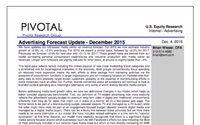Wall Street's Wieser Downgrades Madison Ave.'s Long-Term Outlook To 'Tepid,' Cites Ad Blocking
- by Joe Mandese @mp_joemandese, December 4, 2015

Citing "limited creation" of the kind of new mass marketing categories known to stimulate ad spending as well as a “diminished role” for local marketplaces, an influential ad industry analyst has revised his long-term outlook for growth to be a "tepid pace." The update, which comes on the eve of Monday’s release of new outlooks from the major agency holding companies' advertising forecasters, comes from Pivotal Research Group’s Brian Wieser, who previously was Madison Avenue’s lead forecaster when he held that role at Interpublic’s Magna Global unit.
While Wieser's long-term downgrade is modest -- shaving just a tenth of a percentage point off his 2016 and 2017 outlooks -- he said his new models call for the ad economy to expand "around or slightly better than +3%" for the foreseeable future. On the bright side, Wieser did upgrade his final outlook for 2015 to by three-tenths of a point to +2.8%.
advertisement
advertisement
Other factors influencing the long-term slowdown of ad economy expansion, he said, include important microeconomic factors such as the rising presence of corporate procurement department efforts to "drive savings from marketing activities," as well as "an increasing reliance on marketer-side first-party data to more precisely target known customers," which he said may signal a sustained shift from "brand-building" to performance, or short-term sales results.
Perhaps the most significant existential threat to the ad industry cited by Wieser is the escalating concern among brand marketers "about ad avoidance," which has piqued this year due to a recognition of the prevalence of ad-blocker and other technologies enabling consumers to more seamlessly bypass advertising.
Wieser said those concerns will continue to drive big marketers to "look at branded content spending as a meaningful alternative, only some of which directly benefits media owners."



The pushback has now captured the attention of the investment community which will further reinforce the message that users demands will have to be addressed and advertisers will need to find ways to provide a consumer first experience.
Good post Joe. Regarding the use of more first-party data, I believe 2016 will the be the year of Permission Marketing At Scale. Of course, Seth Godin coined the term 15 years ago, and the concept of 'just asking' consumers for permission to market to them under their conditions has long seemed difficult to drive at scale. But, some of the leading e-tailers, this holiday, and many more next year, are starting to realize that with only fewer than 4% of product page viewers buying, they can 'just ask' by embedding Intelligent Triggered Alerting tech at the page. As the consumer leaves the page, instead of only predictive and retargeting kicking in, a form on the page offers alerts via email and SMS on price drops, new items by the brand, new reviews, back in stock and more.